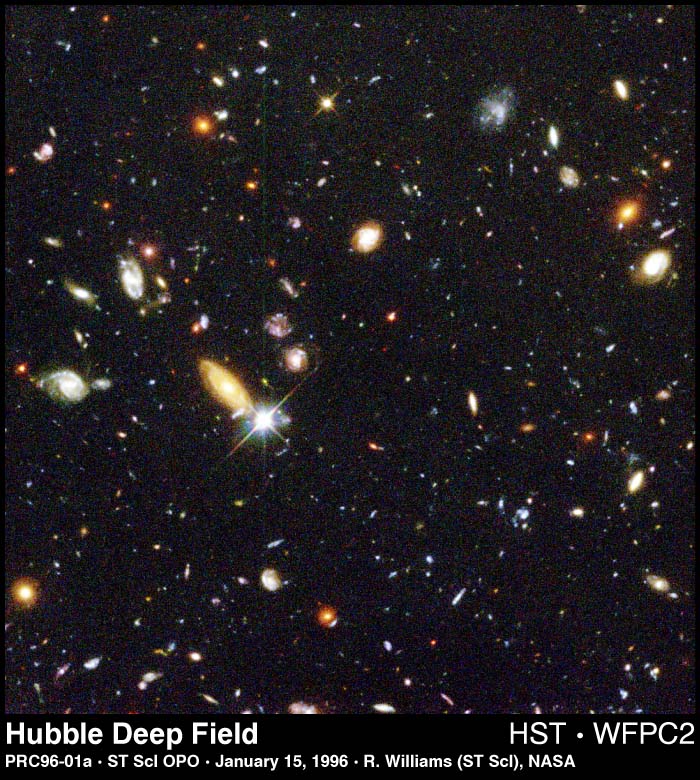
This class will cover a selection of topics in astrophysics that are
of interest to the professor and the students enrolled in the class.
Undergraduate
astrophysics is prerequisite, but usually a motivated student can
succeed
by doing some reading during the winter break to prepare for the class.
Physics 785 is also prerequisite.
Astrophysics is not so much a branch of physics as a concatenation of all of physics, applied to all there is: the universe. Thus a study of astrophysics requires first an extensive knowledge of physics. In this class, I shall assume that all of you have a basic working knowledge of undergraduate physics: mechanics, electricity and magnetism, quantum mechanics and thermodynamics. No graduate courses other than Phys 785 are prerequisite to this course. Undergraduate astronomy of some sort is a prerequisite: ASTR 420 is preferred. Because the field is so broad, I have chosen a selection of topics that interest me. The textbook - Rybicki and Lightman - covers some but not all of these topics. Frank Shu's book The Physics of Astrophysics covers the basics of astrophysics as described by one of the masters in the field, but is quite difficult. I have listed it as an optional text. The new text The tapestry of modern astrophysics by Steven N. Shore should also be a useful reference. Lyman Sptizer's book on the interstellar medium covers material in the second half of the course. I will be asigning some problems from Shu's book. Problems will be assigned throughout the semester. Assignments turned in late will be accepted only under exceptional circumstances. Please note that many of the assignments will involve a computer calculation. Computers are an essential tool of all astrophysicists. You should have some familiarity with at least one computer language such as C, FORTRAN, BASIC, IDL, or a math package such as MATHEMATICA or MAPLE. Computers may also be used to construct plots and diagrams in other assignments.
Please feel free to discuss all aspects of the class with me at any time. Discuss the homework problems among yourselves as well as with me. Try to attend published office hours, but also feel free to knock on my door whenever I am there (I'll tell you if I am busy!).
As graduate students, more is expected of you. You may find it helpful,
indeed necessary, to use reference materials other than the assigned
texts. I may include journal articles as assigned reading to be
discussed in class. You will need to become proficient at using the
Astophysics Data System. We'll discuss this in class. The class will be
run as a seminar. I will
give some lectures, but I will also assign readings in the text as well
as in the astrophysics journals, which we will then discuss in
class. Some lecture notes are available on line. Check the
class
schedule.
link to astro-ph
Class assignments will include homework problems and a term paper. The paper should be a major project that I expect you to work on all semester (not just the last week). Due dates for topic, abstract etc are listed in the class schedule. Please begin to think about your topic immediately.
All paper assignments must be typed.
The topic statement should be about a page long (typed, double-spaced) and should include at least one reference. You may choose to do a review, or to complete an original project.
The abstract should be at least a full paragraph. The outline should indicate section and subsection headings. You should have at least a half dozen references by this time.
A 1st draft should be a complete paper, with references and figures. You may have some calculations to complete or a few ideas still to include. Figures may need further work. A suitable paper will be 15-30 pages (typed, double-spaced) and will include technical material appropriate to a graduate-level Physics class.
The 2nd draft should be your final paper, and should be essentially complete. It should include response to my comments on the first draft, but may need a final polish.
Student presentations will be given during the last week of class, and also during the final exam period (Thursday May 25th). All students must be present during all the presentation periods.
Class is scheduled Tu Th 2:10-3:25pm in Spring 2006. The room is HSS 302.
Texts:
Suggested reading for those who have not taken undergraduate
astrophysics:
The Physical Universe. Frank Shu. University Science Books.
Do the problems!!
More info and class schedule in detail